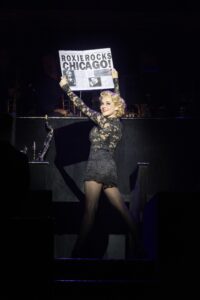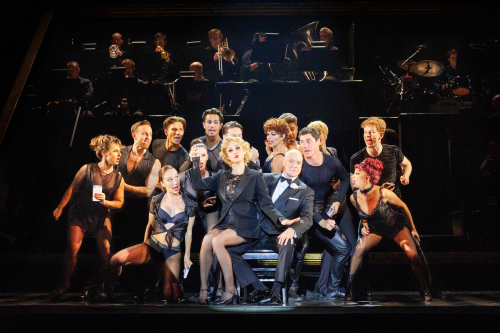Capitol Theatre, June 13
7/10

Chicago borrowed two of the most vacuous characters in theatrical history – Velma Kelly and Roxie Hart – and made them razzle-dazzle the world. Simultaneously its creators, John Kander, Fred Ebb and Bob Fosse, launched a satirical rocket attack on the US justice system, which, alas, apparently failed to penetrate the large “for sale” sign.
Contrary to contemporary mythology, narcissism and a craving for celebrity are not products of our digital age, but were there from time we started speaking rather than grunting. They were certainly thriving in the 1920s, when the lure of fame could topple the fear of being hanged in the puny minds of man-killers Velma and Roxie.
Chicago was revolutionary in 1975, and its unique blend of Brecht, Vaudeville, jazz, comedy, sex and rampant immorality holds its lustre to the extent that it’s less than six years since the show last hit town. In fact, you don’t have to have been around the block too many teams to have seen half a dozen productions, all strictly based on Fosse’s original. The set’s always the same, with the 14-piece band mounted on upstage steps, and the costumes are always black and as slinky – for both sexes – as is legal.

What primarily sets one Chicago apart from another comes down to the performances of those playing Velma, Roxie and Billy Flynn (their celebrity lawyer) and the realisation of Fosse’s choreography. This production doesn’t hold a candle to the 2009 iteration with Karen Millerchip as Roxie and Caroline O’Connor as Velma, but it does many things very well.
It’s the first time I’ve seen someone playing Billy Flynn upstage the women. Anthony Warlow does that effortlessly. Older than most Flynns and looking like a cross between Michael Caine and John Clarke, he oozes debonair charm like man who’s had great sex for breakfast, followed by a most gratifying appointment with his tailor, and oysters and champagne for lunch. That’s backed up by his voice, a velvety baritone which blows everyone else off the stage as it swoons across All I Care About Is Love and Razzle Dazzle.

Shadowing Warlow in quality is Lucy Maunder as Roxie., who snaps and crackles with the requisite blend of comedic and sexual energy. The problem is that the Roxie/Velma chemistry is pivotal to the show’s success, and Zoe Ventoura is a less convincing Velma. Her singing voice is sometimes brittle, her Chicago accent wanders from Illinois to Australia and back, and she simply fails to inhabit Velma as completely as Maunder inhabits Roxie. The discrepancy is such that if you’d never seen Chicago before, you’d leave thinking Roxie was the lead and Velma a support. Happily Ventoura improves markedly in the second act, notably for When Velma Takes the Stand, so all is not lost, and the production is amply good enough to ensure we can relish the show’s inherent pizazz.
The ensemble’s execution of the choreography is razor-sharp, although in terms of sexiness, it’s more safety razor than cut-throat. The band, directed by Anthony Barnhill, is all class, sass and exactitude, and the sound is exceptional. More pearls are to be found in the minor roles, too. Asabi Goodman has the barnstorming voice to electrify Mama Morton’s When You’re Good to Mama, and Peter Rowsthorn is as good an Amos (Roxie’s beleaguered husband) as I’ve seen, making his Mister Cellophane a genuine highlight. So, even with its flaws, it’s still a hell of a show. Like the US justice system.
Until July 28.